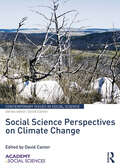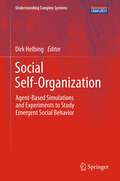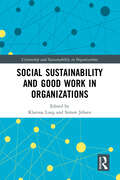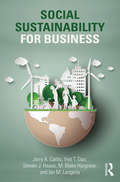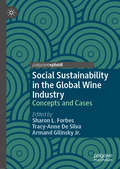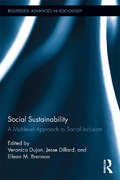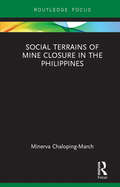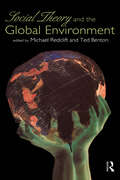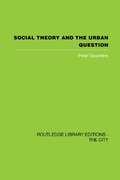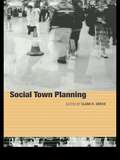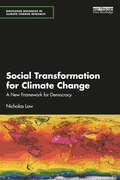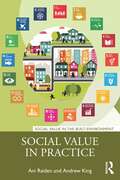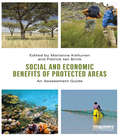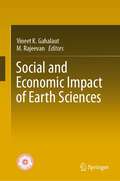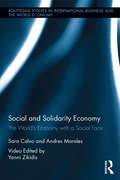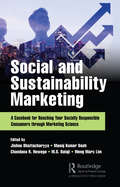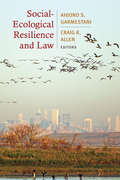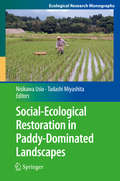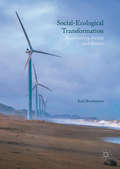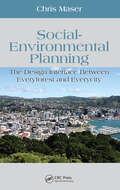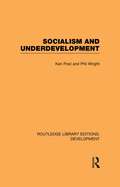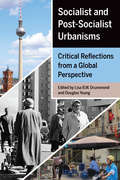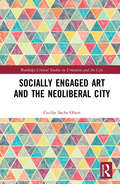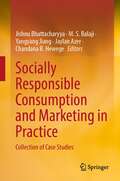- Table View
- List View
Social Science Contemporary India-II class 10 - NCERT - 23 (Geography)
by National Council of Educational Research and TrainingSocial Science Contemporary India-II is an NCERT textbook designed for Class 10 students, offering an in-depth exploration of various aspects of contemporary India. Divided into different chapters, the book covers a wide array of topics crucial to understanding India's social, economic, political, and cultural landscape. It delves into themes such as resources and development, agriculture, industries, globalization, and sectors like tourism and IT. Additionally, it sheds light on challenges faced by India concerning sustainable development, gender, and democracy. The book emphasizes the significance of inclusive growth, environmental conservation, and the role of technology in shaping India's future. Through case studies, maps, illustrations, and engaging narratives, it provides comprehensive insights into the diverse facets of India's society and economy, encouraging critical thinking and a deeper understanding of the nation's complexities. It aims to equip students with the knowledge and analytical skills necessary to comprehend contemporary India's dynamics and encourages them to become responsible and informed citizens.
Social Science Perspectives on Climate Change (Contemporary Issues in Social Science)
by David CanterAlthough it is generally accepted that the climate is changing for the worse and that human activities are a major contributing factor in that change, there is still only marginal response to the challenge posed by climate change. The reasons behind this limited response are becoming clearer through the recognition that climate change is not just a set of physical science facts, but it is also part of a series of complex social processes. Consequently, this book is important in providing social science perspectives on a range of attempts to adjust human activity to reduce its environmental impact. These attempts vary from the changing of the dress code in Japanese offices to the creation of zero-carbon, gated communities in Bangalore, India. Taken together, the contributions to this book provide timely insights into the complexities of saving the planet through human endeavour. This book was originally published as a special issue of Contemporary Social Science.
Social Self-Organization
by Dirk HelbingWhat are the principles that keep our society together? This question is even more difficult to answer than the long-standing question, what are the forces that keep our world together. However, the social challenges of humanity in the 21st century ranging from the financial crises to the impacts of globalization, require us to make fast progress in our understanding of how society works, and how our future can be managed in a resilient and sustainable way. This book can present only a few very first steps towards this ambitious goal. However, based on simple models of social interactions, one can already gain some surprising insights into the social, ``macro-level'' outcomes and dynamics that is implied by individual, ``micro-level'' interactions. Depending on the nature of these interactions, they may imply the spontaneous formation of social conventions or the birth of social cooperation, but also their sudden breakdown. This can end in deadly crowd disasters or tragedies of the commons (such as financial crises or environmental destruction). Furthermore, we demonstrate that classical modeling approaches (such as representative agent models) do not provide a sufficient understanding of the self-organization in social systems resulting from individual interactions. The consideration of randomness, spatial or network interdependencies, and nonlinear feedback effects turns out to be crucial to get fundamental insights into how social patterns and dynamics emerge. Given the explanation of sometimes counter-intuitive phenomena resulting from these features and their combination, our evolutionary modeling approach appears to be powerful and insightful. The chapters of this book range from a discussion of the modeling strategy for socio-economic systems over experimental issues up the right way of doing agent-based modeling. We furthermore discuss applications ranging from pedestrian and crowd dynamics over opinion formation, coordination, and cooperation up to conflict, and also address the response to information, issues of systemic risks in society and economics, and new approaches to manage complexity in socio-economic systems. Selected parts of this book had been previously published in peer reviewed journals.
Social Sustainability and Good Work in Organizations (Citizenship and Sustainability in Organizations)
by Klarissa Lueg Simon JebsenThis edited research monograph collects nine unique research contributions on the concept of social sustainability and its connection to possibilities and hindrances for good work in organisations. Social sustainability, in organisational contexts, emphasizes the long-term well-being of stakeholders and communities. The authors in this book demonstrate how organisational long-term strategies should prioritise employee well-being, mental health, community engagement, and ethical supply chain management, inter alia. Readers, from undergraduate students to the research community, will learn how long-term social sustainability orientation is different from Corporate Social Responsibility, which responds to immediate stakeholder expectations. The United Nations' Sustainable Development Goals have nudged many organisations to implement social sustainability, and many authors in this book relate to UN concepts such as the SDGs or Global Compact’s definition of social sustainability. However, many organisations have come under scrutiny for acting merely ceremonial to live up to the current megatrends. In consequence, readers will take away that the line between genuine corporate mission and ceremonial lip services must be critically observed, and how this can be done in different areas. Key chapters of this book explore social sustainability, e.g., in higher education (as sustainable knowledge in business students), in corporate communication (employee identification, corporate volunteering, and corporate heritage), and in sustainable human resource management practices. Workplace toxicity, especially towards minorities, is explored, highlighting both the role of bystanders, and the financial repercussions of ignoring workplace harassment. Digital transformation's social implications, employee well-being, and the importance of psychological safety in startups are addressed. The chapters, all together, signify the relevance of meaningful work for long-term societal cohesion and individual fulfilment.
Social Sustainability for Business
by Jerry A. Carbo Viet T. Dao Steven J. Haase M. Blake Hargrove Ian M. LangellaSocial Sustainability for Business demonstrates the need for a transformational change to the way businesses across the globe operate. What has become the standard, accepted "business model," with a focus on corporate profit, shareholder wealth maximization, and GDP growth, is no longer a sustainable business model for workers, consumers, communities, society, the planet, or any of its inhabitants and ecosystems. The authors argue that the current commercial system depletes natural resources, denigrates human rights, and inhibits positive social and technological innovation. To address these issues, they focus on societal goals—such as a sustainable planet, meeting human rights of workers, and safe products for consumers—and outline steps that organizations and individuals must take to achieve them. Readers will gain insight into the psychological barriers to and influences on sustainable behavior. They will also learn how reconsidering corporate social responsibility and business ethics can stop and reverse the destruction of a profit-based approach. Cases on modern examples of sustainability or lack thereof explain how establishing and maintaining a socially sustainable business system can protect the environment, meet the rights of its people, and ensure that their needs are met tomorrow. End-of-chapter and end-of-case discussion questions will help students in sustainability classes to think critically about the practical impact of the topics discussed.
Social Sustainability in the Global Wine Industry: Concepts and Cases
by Armand Gilinsky Jr. Sharon L. Forbes Tracy-Anne De SilvaThis book examines the social dimension of sustainability in the wine industry. Social sustainability focuses on people and communities. Contributors explore topics such as philanthropy, poverty, natural disasters, communication, and wine tourism from a global perspective using research and case studies in developed and developing countries. This edited book provides researchers, academics, practitioners and students with varied perspectives of social sustainability in the global wine industry.
Social Sustainability: A Multilevel Approach to Social Inclusion (Routledge Advances in Sociology #101)
by Veronica Dujon Jesse Dillard Eileen M. BrennanHow can we raise the standard of living of the world’s poor and maintain high levels of social health and well-being in the developed world, while simultaneously reducing the environmental damage wrought by human activity? The social dimension of sustainability is becoming recognized as a necessary if not sufficient condition for attaining economic and environmental sustainability. The requisite dialogue requires inclusion at multi-levels. This collection of works is an ambitious and multi-disciplinary effort to indemnify and articulate the design, implementation and implications of inclusion. Included are theoretical and empirical pieces that examine the related issues at the local, national and international levels. Contributors are grounded in Sociology, Economics, Business Administration, Public Administration, Public Health, Psychology, Anthropology, Social Work, Education, and Natural Resource Management.
Social Terrains of Mine Closure in the Philippines (Routledge Studies of the Extractive Industries and Sustainable Development)
by Minerva Chaloping MarchThe current discourse on mine closure is informed predominantly by industry and corporate perspectives and predicated by experiences of mainly mining companies that are based in developed countries where necessary planning frameworks and regulatory requirements are well-established. Mine closure planning, well promoted and accepted as good business practice in the global minerals industry, has been primarily technical and precautionary both in approach and focus. Planning, modelling and monitoring strategies incorporate comprehensive and detailed elements such as properties inherent in landforms, climate, geology, flora and fauna, among others. However, locality-based concerns that revolve around resource access and tenure, rights and entitlements tied to locality and indigeneity, labour recruitment, and other non-bio-physical elements are hardly examined. Any mine closure program that omits these elements is deficient and therefore ineffective. Social Terrains of Mine Closure in the Philippines, based on ethnographic research and archival materials, presents the varying experiences of three mines to demonstrate that the mine closure process is an intense locus for competition and compromises among various social actors. This book offers key messages for understanding the complex socio-cultural, economic, political, and business realities that make up the social terrains of mine closure, and will be of great interest to students and researchers in development studies, community development, business studies, anthropology, and sociology. It will also appeal to those working in the global minerals sectors and NGOs that engage in development work and advocacy for responsible mining.
Social Theory and the Global Environment (Global Environmental Change Ser.)
by Ted Benton Michael RedcliftThis book marks a watershed in the social sciences. The qualitative, critical perspective of sociology and allied disciplines challenges the technocentric `managerialism' which dominates environmental policy, its discourse and its impact. The authors explore the relationship between social theory and sustainability in an attempt to transend technical rhetoric and embrace a broader understanding of `nature'.
Social Theory and the Urban Question
by Peter SaundersSocial Theory and the Urban Question offers a guide to, and a critical evaluation of key themes in contemporary urban social theory, as well as a re-examination of more traditional approaches in the light of recent developments and criticism. Dr Saunders discusses current theoretical positions in the context of the work of Marx, Weber and Durkheim. He suggests that later writers have often misunderstood or ignored the arguments of these 'founding fathers' of the urban question. Dr Saunders uses his final chapter to apply the lessons learned from a review of their work in order to develop a new framework for urban social and political analysis. This book was first published in 1981.
Social Town Planning
by Clara H. GreedMany issues such as access for the disabled, childcare facilities, environmental matters, and ethnic minority issues are excluded from town planning considerations by planning authorities. This book introduces the concept of `social town planning' to integrate planning policy and practices with the cultural and social issues of the people they are planning for. Part 1 provides background on the development of a social dimension to the predominantly physical, land use based, British town planning system. Part 2 investigates a representative selection of minority planning topics, in respect of gender, race, age and disability, cross-linked to the implications for mainstream policy areas such as housing, rural planning and transport. Part 3 discusses the likely influence of a range of global and European policy initiatives and organisations in changing the agenda of British town planning. Planning for healthy cities, sustainability, social cohesion, and equity are discussed. Part 4 looks at `the problem' from a cultural perspective, arguing that a great weakness in the British system, resulting in ugly and impractical urban design, has been the lack of concern among planners with social activities and cultural diversity. Alternative, more culturally inclusive approaches to planning are presented which might transcend the social/spatial dichotomy, such as urban time planning. Concluding that the process of planning must change, the authors ague that the culture and composition of the planning profession must particularly change to be more representative and reflective of the people they are `planning for', in terms of gender, race and minority composition.
Social Transformation for Climate Change: A New Framework for Democracy (Routledge Advances in Climate Change Research)
by Nicholas LowThis book argues that social transformation is both necessary and possible if democracies are to respond effectively to the climate crisis without social collapse. Climate transformation and social transformation are intimately connected. Understanding how to address climate change requires a historical approach both to the climate and to our collective institutions of humanity. Drawing on the works of Karl Polanyi and Thomas Piketty, Nicholas Low traces the course of historic social transformations from Britain, Russia, and Australia to highlight key commonalities: social crisis, the widespread sense by those in power that ‘something has to change’, the shift in ideology, and the political champions that drove the change. Within its international scope, the book delves deeper into specific instances of inequality and poverty from Britain, the USA, Australia, and the Global South. It shows how these examples are connected with the current climate emergency. Finally, the author draws together all the evidence from past transformations to outline how a new social democratic transformation could generate a better future, creating the social solidarity necessary to cope with the climate crisis. This book will be of great interest to students and scholars of climate change, environmental politics and policy, political ecology, environmental sociology, and environmental studies more broadly. Its argument is also highly relevant for political actors working towards social and economic transformation.
Social Value in Practice (Social Value in the Built Environment)
by Andrew King Ani RaidenSocial Value in Practice offers the reader a simple, accessible guide for considering, creating, and delivering social value in projects and within their organisation. The book connects social value to the global Sustainable Development Goals (SDGs) and presents an insight into the many and different practical ways in which individuals and organisations can make a positive impact towards resolving the ‘people, planet and prosperity’ agenda: 'Good work' – good practice in managing people, including working conditions, and equality, diversity, and inclusion Education, skills, and employment, including apprenticeships and enhancing the industry image Social procurement and circular supply chains Strategic partnerships and social enterprises Community development, regeneration, and placemaking Construction consultancy Architecture, design, and construction Assessing and measuring social value. Reflective practitioners can pick it up, turn to a chapter, and learn something they can use right away. Through numerous practical examples and think pieces, this book can help readers learn how to create social value, how to improve and build upon current practice, and how to co-create social value in partnership with clients and the supply chain. The authors aim to empower and inspire stakeholders to engage with new ideas and create more value for those using the built environment. This book is a must read for all those involved in procuring, tendering, planning, designing, developing, funding, building, working in, and managing the built environment.
Social and Economic Benefits of Protected Areas: An Assessment Guide
by Marianne Kettunen Patrick Ten BrinkProtected areas (PAs) contain biodiversity and ecosystems of high conservation value. In addition, these areas provide a range of benefits, both direct and indirect, to our societies and economies, i.e. so called ecosystem services. These services include, for example, an ecosystem's ability to regulate floods and climate, purify water, secure the pollination of crops, and create opportunities for recreation, culture and tourism. This book offers a comprehensive introduction to the socio-economic benefits of PAs and PA networks and provides step-by-step practical guidance on identifying, assessing and valuing the various ecosystem services and related benefits provided by PAs. It also aims to improve the communication of PA benefits to different stakeholders and the general public. It is shown that identifying and valuing the socio-economic benefits of PAs can be beneficial for several reasons. Demonstrating socio-economic importance of a protected site can significantly increase political and stakeholder support for the site and resolve conflicts between different interest groups. This can lead to positive changes in policies and decision-making. Insights on PA benefits are also needed to identify a combination of actions and land use practices that best support the sustainable and equitable utilisation of these benefits, while retaining a site’s conservation goals. Finally, demonstrating different benefits can help to discover alternative and sustainable sources for financing the management of PAs.
Social and Economic Impact of Earth Sciences
by Vineet K. Gahalaut M. RajeevanThis book collects research papers on the economic and social impact of earth sciences. It covers topics related to weather forecasting, climate modelling, monsoon variability, air pollution, heat and cold wave, deep sea mineral and living resources, ocean state monitoring, tsunami and earthquake monitoring, desalination, coastal research, etc. The book focuses on the activities of the Ministry of Earth Sciences, India, in promoting the societal and economic impacts of earth science research in a simple language and in the form of stories and case studies, so that people with basic science degree can understand them.
Social and Solidarity Economy: The World’s Economy with a Social Face (Routledge Studies in International Business and the World Economy)
by Sara Calvo Andres Morales Yanni ZikidisThis book aims to provide the reader with an insight into the relevance of a section of the economy, which is often referred to as the ‘social and solidarity economy’ (SSE); and highlight some of the current issues in the field, how they are being addressed and some of their future implications. Using case studies from around the world, this book ‘Social and Solidarity Economy: The World’s Economy With a Social Face’ provides an up-to-date account of the strengths and weaknesses of these initiatives across four continents including issues that have not been researched sufficiently before (e.g. circular economy, social propaganda and its dangers, social enterprise as a panacea for NGOs in developing countries, and ‘new’ social movements). There is growing interest in SSE initiatives among policymakers, foundations, researchers and academic institutions around the world. Despite this interest, SSE related research remains scarce. There are concerned that SSE initiatives, which contribute significantly to their local communities’ development, need to be more widely disseminated amongst the general public. The Social and Solidarity Economy: The World’s Economy With a Social Face will help promote the ground-breaking work being done by organisations and individuals but which remain undocumented and help to raise awareness of such initiatives as well as contribute to academia with a critical approach to the sector covering issues that have not been covered much before, such as the circular economy and the dangers of social propaganda. Aimed at researchers, academics and policy makers in the fields of Social Enterprise, CSR, Tourism, International Economics as well as supporting disciplines ‘Social and Solidarity Economy: The World’s Economy With a Social Face’ looks to establish and help define the field.
Social and Sustainability Marketing: A Casebook for Reaching Your Socially Responsible Consumers through Marketing Science
by Manoj Kumar Dash Weng Marc Lim Jishnu Bhattacharyya Chandana Hewege M.S. Balaji"... an important intervention in the conversation around social and ecological sustainability that draws on both micromarketing and macromarketing scholarship to help the reader understand the challenges with illustrations from insightful cases both from emerging and developed economies. This compilation should be essential reading for the discerning student of sustainable consumption and production." -- Professor Pierre McDonagh, Associate Editor, Journal of Macromarketing (USA); Professor of Critical Marketing & Society, University of Bath, UK Experts in the field of economics, management science, and particularly in the marketing domain have always been interested in and acknowledged the importance of sustaining profitable businesses while incorporating societal and environmental concerns; however, the level of existing literature and availability of teaching cases reflect a dearth of real case studies, especially those focused on marketing for social good. This book of actual case studies will address that need. In addition, this book is important and timely in providing a case book for instructors (those in both industry and academia) to help them in teaching and training the next generation of leaders through corporate training and universities. Currently, marketing for social good is increasingly becoming a part of most curriculums under the umbrella of different titles, such as social marketing, green marketing, and sustainability marketing. The relevance of these studies is increasing across the globe. This book is composed of long and short real cases with varying complexity in different sectors. This case book will also cover some review articles for an overview of the recent developments in the study area. With these case studies, collections of questions, teaching materials, and real-life marketing scenarios, this book offers a unique source of knowledge to marketing professionals, students, and educators across the world. The main objective of this case book is to understand the applicability of marketing science (marketing for social good context, such as social marketing and sustainability marketing) in internet marketing related to e-buying behavior and e-WOM. In addition, it illustrates the various types of existing marketing practices that are relevant from both theoretical and practical points of view in this electronic era, as well as discussing other non-electronic marketing practices and focusing on consumer buying behavior. As a result, marketing managers can treat their customers according to their desired value. This book particularly explores the possibilities and advantages created by social marketing and sustainability marketing through the presentation of thorough review articles and case studies. This case book helps corporate training centers and universities with compact teaching reference materials in their relevant courses.
Social-Ecological Resilience and Law
by Craig Allen Ahjond GarmestaniEnvironmental law envisions ecological systems as existing in an equilibrium state, reinforcing a rigid legal framework unable to absorb rapid environmental changes and innovations in sustainability. For the past four decades, "resilience theory," which embraces uncertainty and nonlinear dynamics in complex adaptive systems, has provided a robust, invaluable foundation for sound environmental management. Reforming American law to incorporate this knowledge is the key to sustainability. This volume features top legal and resilience scholars speaking on resilience theory and its legal applications to climate change, biodiversity, national parks, and water law.
Social-Ecological Restoration in Paddy-Dominated Landscapes
by Nisikawa Usio Tadashi MiyashitaWith a focus on environmentally friendly rice farming, this unique book integrates both ecosystem and human dimensions of ecological restoration to provide strategies to promote sustainable agriculture and rural development. Paddy fields have multiple functions beyond their role of producing rice: They serve as refuge habitats for a range of wildlife that once inhabited floodplain wetlands and contain a number of unique and threatened aquatic species. They also provide various ecosystem services for regional communities such as water retention, erosion control, flood control, fish culture, and educational opportunities. However, rice paddies are threatened worldwide due to the modernization of agriculture and abandonment of farmland caused by depopulation and the aging of rural communities. Therefore, multiple ecological and sociological aspects must be considered in the ecological restoration of paddy fields. This book aims to do so by incorporating various disciplines of natural and social sciences. Strategies for sustainable agriculture are reviewed, including financial incentives for farmers and the use of flagship wildlife species such as the crested ibis (toki) to promote ecological restoration. With the increasing popularity of environmentally friendly rice farming in parts of Asia and the western United States, this book offers model cases for sustainable management of paddy-dominated landscapes.
Social-Ecological Transformation
by Karl BruckmeierThis book advances a social-ecological theory to reconnect nature and society through sustainable transformation of interacting social and ecological systems. Social ecology develops as an interdisciplinary science by using knowledge from the social sciences, especially sociology and economics, and from natural-scientific ecology. Knowledge integration across the boundaries of social and natural sciences is not widespread, blocked by the specialisation of theories and their competing forms of explanation and interpretation. Chapters in this book describe a new social-ecological theory that connects concepts and theories from both sides to create a new interdisciplinary theory. Inter- and transdisciplinary knowledge synthesis creates possibilities to analyse global environmental problems more systematically by integrating specialized research on environmental problems. The author uses social-ecological theory to analyse and explain problems and processes of global change in modern society such as climate change and adaptation to it, ecosystem change, and transformation of the industrial energy regime , finally offering pathways of transformation to a future sustainable society.
Social-Environmental Planning: The Design Interface Between Everyforest and Everycity (Social Environmental Sustainability)
by Chris MaserWith the environment, climate change, and global warming taking center stage in the national debate, the issues seem insurmountable and certainly unsolvable at the local level. Written by Chris Maser, international consultant on forest ecology, sustainable forestry practices, and sustainable development, Social-Environmental Planning: The Design In
Socialism and Underdevelopment (Routledge Library Editions: Development)
by Ken Post Philip WrightIn this book, first published in 1989, Ken Post and Phil Wright provide a critical analysis of socialist construction in underdeveloped countries. Pointing out that all the socialist revolutions of the twentieth century have occurred in underdeveloped peripheral capitalist countries, they focus on the relationship between socialism and underdevelopment. They bring together the insights of both development theory and the political economy of socialism, and draw upon their direct experience of the state socialist societies as diverse as North Korea, Yugoslavia, Vietnam, and the Soviet Union.
Socialist and Post-Socialist Urbanisms: Critical Reflections from a Global Perspective (G - Reference,information And Interdisciplinary Subjects Ser.)
by Douglas Young Lisa B DrummondSocialist cities have special qualities which endure in particular, subtle, and often under-theorized ways. This book engages with socialism on a global scale, as well as the variety of socialist urbanisms and post-socialist urbanisms, and the range of ways in which globalization intersects with changes in socialist and post-socialist cities. Offering a unique international comparative focus, the book’s fourteen case studies from Asia, Europe, Latin America, and Africa are grouped under three main themes: housing experiences and life trajectories, planning and architecture, and governance and social order. Featuring contributors from a range of disciplinary backgrounds and research foci, Socialist and Post-Socialist Urbanisms brings together a collection of essays on cities that are often overlooked in mainstream urban studies.
Socially Engaged Art and the Neoliberal City (Routledge Critical Studies in Urbanism and the City)
by Cecilie Sachs OlsenWhat are the social functions of art in the age of neoliberal urbanism? This book discusses the potential of artistic practices to question the nature of city environments and the diverse productions of space, moving beyond the reduction of ‘the urban’ as a set of existing and static structures. Adopting a practice-led approach, each chapter discusses case studies from across the world, reflecting on personal experiences as well as the work of other artists. While exposing the increasingly limiting constraints placed on public and socially engaged art by the dominance of commercial funding and neoliberal frameworks, the author stays optimistic about the potential of artistic practices to transcend neoliberal logics through alternative productions of space. Drawing upon a Lefebvrian framework of spatial practice and using a structuralist approach to challenge neoliberal structures, the book draws links between art, resistance, criticism, democracy, and political change. The book concludes by looking at how we might create a new course for socially engaged art within the neoliberal city. It will be of great interest to researchers in urban studies, urban geography, and architecture, as well as students who want to learn more about place-making, visual culture, performance theory, applied practice, and urban culture.
Socially Responsible Consumption and Marketing in Practice: Collection of Case Studies
by Jishnu Bhattacharyya M. S. Balaji Yangyang Jiang Jaylan Azer Chandana R. HewegeThe book provides an overview of socially responsible consumption and marketing, as well as a collection of teaching cases that discuss and emphasize how 21st-century organizations, both for-profit and non-profit, are addressing socially responsible consumers and meeting their changing needs while remaining profitable. Consumers, governments, academics, and practitioners are becoming more interested in promoting positive social changes through consumption. As a result, this book aims to understand the practice of marketing in bringing about positive social change through real-life case studies. Consumption by socially responsible consumers who care about the social good is unique, not only because of its inter-disciplinary and substantive subject matter but also because it presents challenges and pushes organizations to make significant changes in the ways they have been accomplishing organizational activities in the twenty-first century, from procurement to production to sales and services. The book goes beyond individual consumers and their lifestyles to promote the scope of discussing marketing strategies. It seeks to comprehend how people consume and how socially responsible consumption is conceived. The case studies present and pursue integrated solutions for more sustainable consumption. This is a must-read for marketers who want to reach out to socially responsible consumers.

